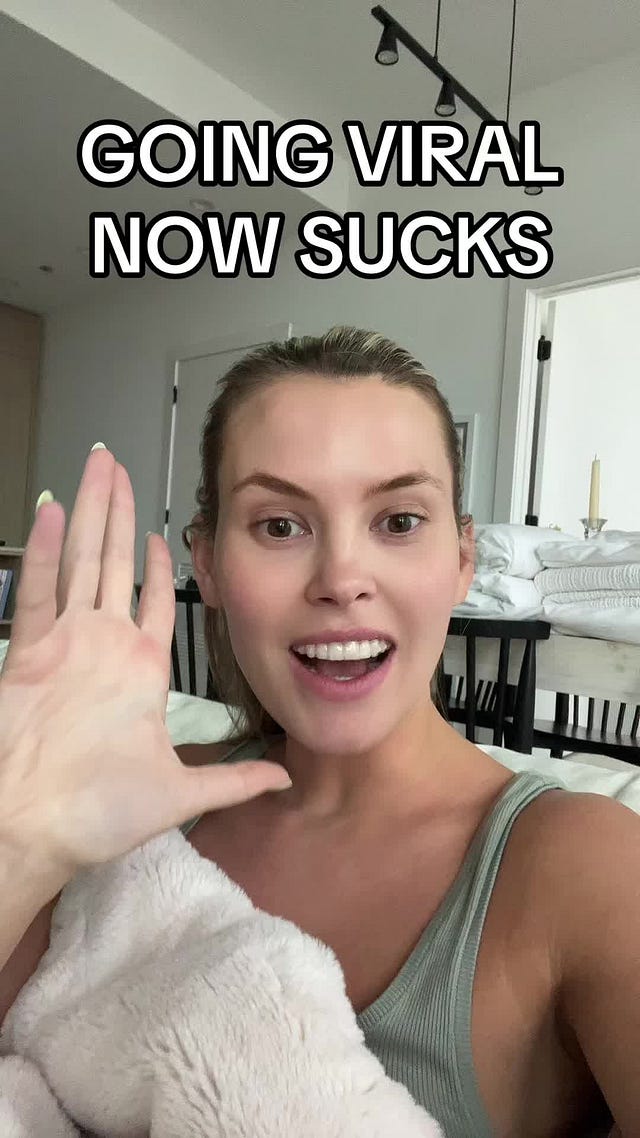Embedded is your essential guide to what’s good on the internet, written by Kate Lindsay and edited by Nick Catucci.
Speaking of going viral: I interviewed Sunday Scroll hall-of-famer Adam Jockle for GQ.—Kate
Almost a year ago, I went viral on TikTok for the first time. I won’t rehash it—I did that here—but if I were to sum it up succinctly, the problem wasn’t the discourse but the fact that my video ended up in front of too many people for it to generate any kind of valuable discussion.
This is not a new complaint. In our My Internet column, almost every respondent who answers the question “Have you ever gone viral?” does so with the caveat that the experience was absolutely horrible. A good rule of thumb is to mute the post (if you can—because on TikTok, you can’t!) whenever it gets above a certain threshold.
And yet, despite the near-consensus that going viral feels bad, we keep barrelling towards discovery-first social media. People are paying for Twitter Blue in hopes of increasing their reach and Instagram has filled its feeds with suggested posts.
But on TikTok, the app where it is most normalized to engage in social media behaviors specifically designed to reach strangers, attitudes may be shifting—among creators, at least.
 Tiktok failed to load.
Tiktok failed to load.Enable 3rd party cookies or use another browser
“I fucking hate going viral,” influencer and former Bachelor contestant Anna Redman says in a recent video. This sentiment was in response to a video she had posted earlier in the month, in which she wears a Kate Moss face filter and jokes that she could give Kendall Jenner a run for her money as a model. It received over 2.6 million views, and was flooded with comments from people who feel it’s important to tell Redman she could never compete with Kendall Jenner, despite the fact that the entire video is a joke.
The video first spread among Redman’s audience, who are familiar with her self-deprecating humor (seriously, she’s a good follow!), but it gained traction with a wider base of users who were curious about the filter. Tons of them stitched her video with videos of themselves trying the filter, which introduced an unprecedented number of strangers to Redman and her joke. This is how TikTok is designed to work. But to make content, no matter how benign, on any of these discovery-first platforms now means you have to accept the possibility that you’ll end up in front of people who are so many layers removed from you that they have no context for your work—and no problem casually hurting your feelings.
“Going viral on here is never, ever my goal anymore,” she says in her follow up video. “Honestly my only goal is to reach the audience I have gained who know me and get my humor.”
That’s easier said than done. According to Redman, even when the video had close to a million views, it had still only reached 3 percent of her followers.
We have, in other words, algorithmed our social media so hard that the audiences creators are having the most trouble reaching are their own.
“It’s really bad for my mental health,” she says.
I wrote about this a little bit last year, when niche cringe content was getting pushed onto my feed for the wrong reasons:
“The original creators came to TikTok for the freedom to explore their passions with like-minded people. But the internet has turbocharged discoverability, and algorithms don’t recommend videos like humans. While common interests drove the videos’ original spread, one negative comment snowballs into another until that’s what the algorithm is picking up on instead, dragging the videos even further away from their original communities.”
The problem has only gotten worse, but it’s not just a problem for us. When I went viral last year, I couldn’t use TikTok for a week because my account was so overwhelmed with (unpleasant) notifications, and it took me another two or three before I was comfortable making a video again. And even then, I only did it because I thought—erroneously—that it would move the conversation away from the viral one, which still receives comments. (I got “Girl get a life and stop writing mediocre articles” just this month! *heart eyes*)
I am just one person, and Redman is just one person, but the more apps prioritize strangers over followers, the worse time we’ll all be having, and more and more people will find themselves less inclined to post on them. When successfully using an app means it becomes borderline traumatizing to use, it’s the app, not us, that is doing something wrong.






*Me reading this while I'm currently in ultra-viral hell from this weekend*